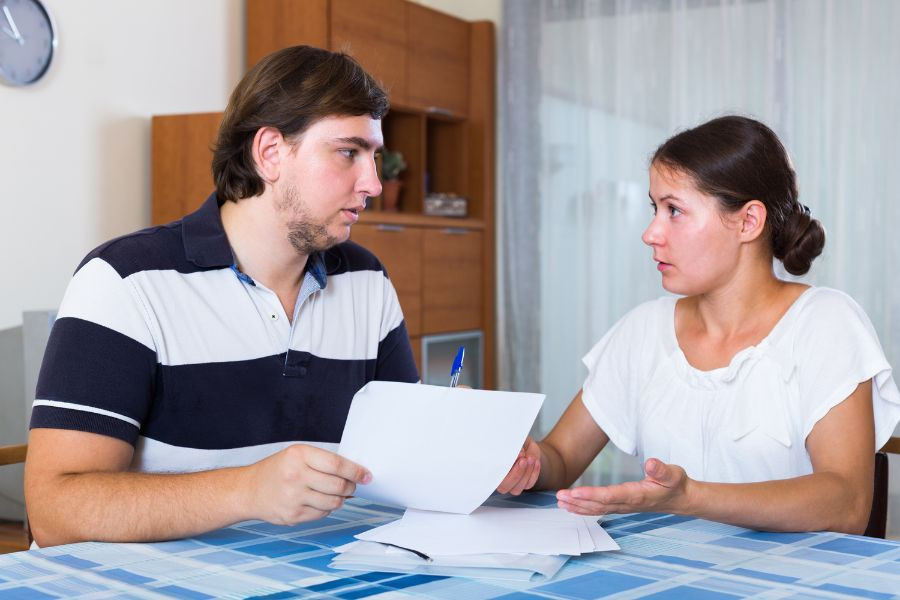

Knowlodge Hub
Uk spouse visa cover letter guide.

UK Spouse Visa Cover Letter .When applying for a spouse visa, a cover letter is an essential part of the application process. It is a document that outlines the purpose of the visa application, highlights the applicant’s relationship with their spouse, and provides any additional information that may be relevant to the application. In this article, we will provide a comprehensive guide on how to write a spouse visa cover letter, including the required information and tips on how to make your cover letter stand out.
What is a Spouse Visa Cover Letter?
A spouse visa cover letter is a document that accompanies the application for a spouse visa. It is used to provide additional information to the immigration officer, who will be making a decision on the visa application. The cover letter should provide an overview of the applicant’s relationship with their spouse, the purpose of the visa application, and any additional information that may be relevant.
Purpose of the Spouse Visa Cover Letter
The purpose of the spouse visa cover letter is to convince the immigration officer that the applicant’s relationship with their spouse is genuine, and that they meet all the eligibility requirements for the visa. The cover letter should provide a clear and concise summary of the applicant’s situation, including the reason for the visa application, the applicant’s personal circumstances, and their relationship with their spouse.
Required Information for the Spouse Visa Cover Letter
The spouse visa cover letter should include the following information:
Introduction
The introduction should provide the immigration officer with an overview of the visa application, including the applicant’s name, their spouse’s name, and the purpose of the visa application.
Relationship with Spouse
The cover letter should outline the applicant’s relationship with their spouse, including how and when they met, when they got married, and any other relevant information about their relationship.
Financial Circumstances
The applicant should provide information about their financial circumstances, including their income, their spouse’s income, and any savings or assets they may have.
Accommodation
The cover letter should provide information about where the applicant and their spouse will be living, including the address and any rental or mortgage agreements.
Supporting Documents
The cover letter should list any supporting documents that are being provided as part of the visa application, including copies of passports, marriage certificates, and financial statements.
The conclusion should summarize the information provided in the cover letter, reiterating the purpose of the visa application and expressing gratitude for the immigration officer’s time and consideration.
Tips for Writing an Effective Spouse Visa Cover Letter
When writing a spouse visa cover letter, there are several tips that can help make your application stand out:
Be Concise and to the Point
The cover letter should be concise and to the point, providing only the necessary information to support your application.
Use a Formal Tone
The cover letter should be written in a formal tone, using professional language and avoiding slang or colloquialisms.
Highlight Your Relationship with Your Spouse
The cover letter should emphasize the genuine nature of the relationship between the applicant and their spouse, providing specific details about their history together.
Provide Relevant Supporting Documents
The cover letter should be accompanied by relevant supporting documents, including copies of passports, marriage certificates, and financial statements.
Proofread and Edit Carefully
The cover letter should be proofread and edited carefully to ensure that there are no errors or inconsistencies.

- What should I include in my spouse visa cover letter? A spouse visa cover letter should include an introduction, information about the relationship with the spouse, financial circumstances, accommodation, and supporting documents. Make sure to emphasize the genuine nature of your relationship with your spouse.
- Can I submit a handwritten cover letter? No, it is recommended to type your spouse visa cover letter and make sure it is clear, concise, and easy to read.
- Should I include a cover letter if I am applying for a fiance visa ? Yes, a cover letter is recommended for all types of visa applications. Make sure to highlight your relationship with your fiance and provide all necessary information.
- How long should my spouse visa cover letter be? Your spouse visa cover letter should be concise and to the point. It is recommended to keep it to one page if possible.
- Can I use a template for my spouse visa cover letter? Yes, there are many Spouse visa cover letter templates available online that can be used as a guide for writing a spouse visa cover letter. However, make sure to customize the letter to your specific situation and provide all necessary information.
In conclusion, a spouse visa cover letter is an essential part of the visa application process. It should provide a clear and concise summary of the applicant’s situation, including the purpose of the visa application, their personal circumstances, and their relationship with their spouse. By following the tips outlined in this guide, applicants can create an effective and convincing cover letter that will help support their visa application
Reason of UK Spouse Visa Refusals
UK Transit Visa Guide in 2023

You may like
Your email address will not be published. Required fields are marked *
Save my name, email, and website in this browser for the next time I comment.
Latest UK Electronic Travel Authorisation (ETA) Scheme

The UK Electronic Travel Authorisation (ETA) scheme is a new digital entry system introduced by the UK government to enhance border security and streamline entry for eligible travelers. Expected to be fully implemented by 2025, the ETA scheme will require visitors from select countries to obtain authorisation before travelling to the UK, even if they do not need a visa.
Here’s an overview of the key details regarding the UK ETA scheme:

1. What is the UK ETA Scheme?
The ETA is a digital authorisation that allows individuals from certain countries to travel to the UK for short-term stays, including tourism, business, or visiting family, without requiring a visa. It is similar to electronic travel systems in other countries, such as the United States’ ESTA or Canada’s eTA.
2. Who Needs a UK ETA?
The UK ETA is mandatory for citizens of countries that currently enjoy visa-free travel to the UK. This includes travelers from EU countries and other nations with similar agreements. However, not all visa-free nationals will need an ETA; exemptions will apply, such as for British and Irish citizens.
List of EU Countries That Will Require a UK ETA
The following EU countries’ citizens will need to apply for a UK ETA before entering the UK:
- Czech Republic
- Netherlands
3. How to Apply for an ETA?
The application process for a UK ETA will be done online, making it quick and convenient. Applicants will need to:
- Provide personal information (such as name, passport details, and travel plans).
- Answer security questions.
- Pay a fee, which has yet to be finalized but is expected to be affordable.
Once the application is submitted, travelers will receive their ETA electronically, typically within a few days.

4. Validity of the UK ETA
The ETA will likely be valid for multiple entries over a set period, potentially for up to two years, depending on the final rules. During this period, visitors can enter the UK multiple times for short visits.
5. When Will the UK ETA Come into Effect?
The ETA scheme is being rolled out in phases. It will first apply to nationals from Gulf Cooperation Council (GCC) countries like Qatar in 2024, and it will gradually expand to include travelers from other visa-exempt nations, including EU countries, by the end of 2025.
6. Why is the UK Introducing the ETA?
The UK government is introducing the ETA to enhance security, better manage border crossings, and gather advance information about travelers. It will also simplify the travel process by allowing pre-approved entry for short stays, reducing the need for more complicated visa applications for eligible travelers.
7. What Happens If You Do Not Have an ETA?
If you are required to obtain an ETA and do not have one when you arrive at the UK border, you may be denied entry. It’s essential for all travelers from ETA-required countries to secure their authorisation before traveling to avoid complications.
8. The UK ETA Schemes
The UK ETA scheme is part of the UK’s broader effort to modernize its immigration and border control systems post-Brexit. For travelers from visa-free countries, the ETA will provide a streamlined and secure way to visit the UK for short trips, making entry faster and more efficient.
Also check another article about The UK eVisa rollout about electronic visas update
Be sure to stay updated on the rollout of the UK ETA and check the official government website Gov.uk for more details when applying for future trips.
Immigration News
Upcoming overhaul of uk visa application centres.

The UK Visas and Immigration (UKVI) department is set to implement major changes to its Visa Application Centres (VACs) between September 2024 and January 2025. As a result, applicants across various regions must be prepared for adjustments to the visa application process. Below is a breakdown of what these changes entail and how they may affect your UK visa application.

1. New Commercial Partners Taking Over Visa Application Centres
During the specified transition period, UKVI’s current commercial partner, TLScontact, will be replaced by VFS Global in certain regions across Africa, Europe, the Middle East, and Central Asia. The transition will not affect all locations globally, so it is essential to verify whether your visa application centre is impacted.
2. What Applicants Need to Do: Stay Informed and Prepared
If your region is affected by these changes, you will be notified by email from either TLScontact or VFS Global. These emails will contain crucial information about how to proceed with your application. Be sure to check your inbox and spam folders frequently. The official emails will come from domains ending in @tlscontact.com or @vfsglobal.com, so double-check the sender before acting on any information.
3. Transition Timeline for Visa Application Centres
Belgium was the first country to experience the transition, with its visa application centre shifting to VFS Global as of 3 September 2024. UK visa applicants in Belgium now need to use VFS Global for scheduling biometrics appointments and other visa services. If you’ve already booked an appointment with TLScontact, you may still attend, but note that additional fees may apply if supporting documents have not been uploaded.
Further changes are scheduled across various countries:
- From 22 October 2024 , VFS Global will take over visa operations in key African countries such as Algeria, Ghana, South Africa, and Kenya, as well as others like Seychelles and Tunisia.
- From 5 November 2024 , the shift will impact countries in the Middle East and Central Asia, including Israel, Iraq, Turkey, and Kazakhstan, among others. Several European locations, including France and Cyprus (North), will also experience this transition.
4. Impact on Applications within the UK
Changes are also coming for visa applicants within the UK. Starting 15 October 2024, the commercial partner responsible for UK Visa and Citizenship Application Services (UKVCAS) will change from Sopra Steria to TLScontact. While this will alter the partner responsible for managing applications, UKVI has assured applicants that the decision-making process, processing times, and appointment availability will remain unaffected.
5. What to Expect from the New Visa Application Process
Despite the sweeping changes, UKVI promises that these updates will streamline the visa application process and enhance the overall experience for applicants. Those who stay informed and follow the instructions provided by UKVI and its partners will find it easy to navigate the new system. It is recommended to subscribe to UKVI updates or regularly check their official website to stay on top of any new developments.
6. Ensuring a Smooth Transition for Visa Applicants
While the changes might seem overwhelming, applicants are encouraged to remain proactive. Be sure to:
- Monitor your email for official notifications.
- Verify the sender’s address to avoid scams.
- Follow the updated procedures laid out by VFS Global, especially in countries where the transition will soon take place.
By staying organized and following the guidelines provided, applicants can ensure a smooth transition and avoid potential delays in their UK visa process.
Lost Your British Passport Abroad?

Losing your British passport while abroad can be a stressful experience, but there are clear steps to take to replace it and continue your travels. The UK government provides several options to help citizens quickly regain the ability to travel, including emergency travel documents. Here’s what you need to know if you lose your passport overseas.
1. Report the Loss of Your Passport
The first step is to report your lost passport to both local authorities and the UK government. You should contact the local police in the country where the passport was lost to obtain a police report. This might be necessary for insurance claims or other official purposes.
Next, report the loss to His Majesty’s Passport Office. You can do this online by visiting the GOV.UK website , which will guide you through the process of reporting a lost or stolen passport. This is crucial as it prevents others from using your lost passport for fraudulent purposes.
2. Apply for an Emergency Travel Document (ETD)
If you need to travel urgently, you can apply for an Emergency Travel Document (ETD). An ETD allows you to travel back to the UK or to certain other countries if your passport is lost, stolen, or damaged. To apply for an ETD, follow these steps:
- Apply online : You can submit an application for an ETD on the GOV.UK website.
- A recent digital passport photo.
- Details of your travel plans (such as flights and destinations).
- A police report (if applicable).
- Proof of identity (such as a driving license or a copy of your passport, if you have one).
- Attend an appointment : You may be required to attend an appointment at the nearest British embassy, high commission, or consulate to complete your ETD application. Be sure to check local embassy guidelines as procedures may vary depending on your location.
3. Collect Your Emergency Travel Document
Once your application has been processed and approved, you will be issued an ETD. Depending on the country you are in, you may be able to collect it from the embassy or have it sent to you. ETDs are generally issued within 2 days, but times can vary based on demand or location.
An ETD can typically be used for one journey (back to the UK or another specified country), and it’s valid for the specific dates and destinations you provide during your application. If you need to make additional stops, you must provide the details when applying, so the ETD covers your entire travel route.
4. Travelling with an Emergency Travel Document
When travelling with an ETD, you will need to show the document to immigration authorities in each country you visit. The ETD should function just like a regular passport for border crossings, but be prepared for additional checks at airports or immigration points.
It is important to note that some countries may require a visa, even if you are travelling with an ETD, so check the entry requirements of the country you are visiting. The ETD must also be accompanied by your valid visa if needed.
5. Apply for a Replacement Passport
Once you return to the UK or your long-term destination, you should apply for a replacement passport as soon as possible. The process is similar to applying for a new passport and can be done online or by post. Ensure you report the loss or theft of your passport if you have not already done so.

Additional Tips:
- Keep copies of your documents : Before travelling, it’s a good idea to keep a digital or physical copy of your passport and other important documents in a secure location or on your phone.
- Emergency contacts : Save the contact information for the nearest British embassy or consulate at your destination in case you need urgent assistance.
By following these steps, you can minimize the disruption caused by losing your passport abroad and ensure a smooth return to your travels. While the process can take some time, having an Emergency Travel Document in hand will allow you to continue your journey or return home with minimal delay.
UK Returning Residence Visa Guide in 2023

A UK Returning Residence Visa is a type of visa that allows British citizens or permanent residents who have lived outside of the UK for an extended period of time to return to the country. This visa is especially useful for those who have lost their permanent resident status due to long-term absence from the UK. In this guide, we will go through the eligibility criteria, requirements, application process, and other important information about the UK Returning Residence Visa.
Who is eligible for a UK Returning Residence Visa?
To be eligible for a UK Returning Residence Visa, you must have been a British citizen or have had indefinite leave to enter or remain in the UK before you left the country. You must have also been living outside the UK for at least two years before you apply for the visa.
What are the requirements for a UK Returning Residence Visa?
In order to obtain a UK Returning Residence Visa, you must meet the following requirements:
- You must have previously been a British citizen or have had indefinite leave to enter or remain in the UK.
- You must have been living outside of the UK for at least two years.
- You must have strong ties to the UK, such as family or property.
- You must have no criminal convictions or pose a threat to national security.
How to apply for a UK Returning Residence Visa?
To apply for a UK Returning Residence Visa, you must complete an online application form and provide the required documents. You can apply from outside the UK or from within the country if you have a valid visa. It is recommended that you apply at least three months before you plan to travel to the UK.

What documents are required for a UK Returning Residence Visa application?
The following documents are required for a UK Returning Residence Visa application:
- A valid passport or travel document
- Proof of residence outside the UK for at least two years
- Evidence of ties to the UK, such as family or property
- A tuberculosis (TB) test certificate (if applicable)
- A criminal record certificate (if applicable)
- Bank statements or other financial documents to prove that you can support yourself during your stay in the UK
What is the financial requirement for the UK Returning Residence Visa in 2023?
To meet the financial requirement for the UK Returning Residence Visa, you must have a certain amount of money in savings or income. The amount you need to have depends on your circumstances, such as whether you are returning alone or with a partner and/or children. Here are the current financial requirements for the UK Returning Residence Visa:
- If you are returning alone, you must have at least £1,890 in savings.
- If you are returning with a partner, you must have at least £2,640 in savings.
- If you are returning with a partner and one child, you must have at least £3,290 in savings.
- If you are returning with a partner and two children, you must have at least £3,890 in savings.
- You can meet the financial requirement through income from employment or self-employment, pensions, or other sources of income.
- If you do not have enough money in savings, you can combine income and savings to meet the financial requirement.
- You must provide evidence of your income and savings as part of your visa application.
How long does it take to process a UK Returning Residence Visa application?
The processing time for a UK Returning Residence Visa application varies depending on the country you are applying from. In some cases, it can take up to 12 weeks to process the application. You can check the processing times for your country on the UK government website.
Can I work in the UK with a Returning Residence Visa?
Yes, you can work in the UK with a Returning Residence Visa. However, you must not start work until your visa application has been approved.
8. Can I bring my family with me on a Returning Residence Visa?
Yes, you can bring your family members with you on a Returning Residence Visa if they meet the eligibility criteria. Your spouse, civil partner, unmarried partner, and children under the age of 18 can apply for a visa as your dependents.
- What happens if my visa application is refused?
If your visa application is refused, you can apply for an administrative review or make an appeal. It is important to carefully review the reasons for the refusal and address them in your appeal or review application.
How long can I stay in the UK with a Returning Residence Visa?
You can stay in the UK with a Returning Residence Visa for up to 5 years. After that, you can apply for settlement, which will allow you to stay in the UK indefinitely.
- Can I apply for a Returning Residence Visa if I was previously a permanent resident but lost my status due to long-term absence from the UK? Yes, you can apply for a Returning Residence Visa if you were previously a permanent resident but lost your status due to long-term absence.
- Can I apply for a Returning Residence Visa if I have a criminal record? It depends on the nature and severity of the offense. You may be ineligible if you have committed certain crimes or pose a threat to national security.
- How much does a UK Returning Residence Visa cost? The fee for a UK Returning Residence Visa is currently £516.
- How long does it take to get a decision on a Returning Residence Visa application? The processing time varies depending on the country you are applying from, but it can take up to 12 weeks in some cases.
- Can I travel to the UK while my Returning Residence Visa application is being processed? It is not recommended to travel to the UK while your application is being processed, as it may affect your application.
Obtaining a UK Returning Residence Visa can seem like a daunting process, but with the right information and preparation, it can be a smooth and successful experience. Remember to carefully review the eligibility criteria, requirements, and application process before submitting your application.
What is the UK Displaced Talent Visa?

UK Displaced Talent Visa .As the world continues to change, so does the job market. The UK Displaced Talent Visa is a new initiative aimed at attracting top talent from countries affected by conflict or natural disasters. This visa offers a unique opportunity for individuals to start a new life in the UK and pursue their careers. In this article, we’ll discuss everything you need to know about the UK Displaced Talent Visa, including eligibility, application process, and benefits.
The UK Displaced Talent Visa is a new visa category that allows talented individuals from countries affected by conflict or natural disasters to come to the UK and work. This visa is aimed at individuals who have exceptional talent in fields such as science, engineering, and technology, and who have been displaced from their home countries due to conflict or natural disasters.
Who is eligible for the UK Displaced Talent Visa?
To be eligible for the UK Displaced Talent Visa, you must be able to demonstrate exceptional talent in a field such as science, engineering, or technology. You must also be able to demonstrate that you have been displaced from your home country due to conflict or natural disasters.
How do I apply for the UK Displaced Talent Visa?
To apply for the UK Displaced Talent Visa, you must first apply for an endorsement from a designated endorsing body. The endorsing body will assess your application and determine whether you meet the eligibility criteria. If your application is successful, you will be issued with an endorsement letter, which you can use to apply for the visa.
What are the benefits of the UK Displaced Talent Visa?
The UK Displaced Talent Visa offers a range of benefits to talented individuals who have been displaced from their home countries. These include the opportunity to work and live in the UK, access to world-class research facilities and universities, and the chance to collaborate with some of the brightest minds in your field.

How long is the UK Displaced Talent Visa valid for?
The UK Displaced Talent Visa is initially granted for a period of 3 years. After this period, you can apply to extend your visa for a further 2 years. After 5 years, you may be eligible to apply for settlement in the UK.
What is the application process for the UK Displaced Talent Visa?
The application process for the UK Displaced Talent Visa involves several steps. Firstly, you must apply for an endorsement from a designated endorsing body. Once you have received your endorsement letter, you can then apply for the visa itself. As part of the application process, you will be required to provide evidence of your exceptional talent, as well as evidence that you have been displaced from your home country.
How long does it take to process a UK Displaced Talent Visa application?
The processing time for a UK Displaced Talent Visa application can vary depending on a number of factors, including the complexity of your application and the number of applications being processed at the time. In general, you can expect the processing time to take between 3-8 weeks.
Can I bring my family with me to the UK on a Displaced Talent Visa?
Yes, you can bring your spouse, partner, and dependent children with you to the UK on a Displaced Talent Visa. Your family members will be able to live and work in the UK for the duration of your visa.
How can the UK Displaced Talent Visa benefit the UK economy?
The UK Displaced Talent Visa can benefit the UK economy in several ways. Firstly, it allows the UK to attract and retain some of the world’s top talent in science, engineering, and technology, which can help to drive innovation and economic growth. Additionally, the visa program can help to address skills shortages in certain sectors, particularly those that have been impacted by the pandemic.
What are the challenges associated with the UK Displaced Talent Visa?
While the UK Displaced Talent Visa offers many benefits, there are also some challenges associated with the program. One of the main challenges is ensuring that the visa program is accessible to those who need it most, particularly those who may not have access to the resources needed to apply. Additionally, there may be challenges in ensuring that individuals who come to the UK on the visa are able to integrate successfully into UK society.
What is the impact of the COVID-19 pandemic on the UK Displaced Talent Visa?
The COVID-19 pandemic has had a significant impact on the UK Displaced Talent Visa program. While the pandemic has highlighted the importance of attracting and retaining top talent in fields such as science and engineering, it has also made it more difficult for individuals to apply for the visa. Additionally, the pandemic has created uncertainty around the future of work and migration, which may impact the visa program in the long term.
What are the key takeaways from the UK Displaced Talent Visa?
The UK Displaced Talent Visa is a new visa category aimed at attracting top talent from countries affected by conflict or natural disasters. The visa offers a unique opportunity for individuals to start a new life in the UK and pursue their careers in fields such as science, engineering, and technology. To be eligible for the visa, individuals must be able to demonstrate exceptional talent in their field and must have been displaced from their home country due to conflict or natural disasters.
- Can I apply for the UK Displaced Talent Visa if I am already in the UK?
No, the UK Displaced Talent Visa is only available to individuals who are outside of the UK. If you are already in the UK, you may be able to apply for a different visa category.
- What documents do I need to provide as part of my visa application?
You will need to provide evidence of your exceptional talent in your field, as well as evidence that you have been displaced from your home country due to conflict or natural disasters. You will also need to provide evidence of your identity and a valid passport.
- How long does the endorsement process take?
The endorsement process can take up to 8 weeks. However, it is important to note that the process may take longer if additional information is required.
- Can I work for any employer on a Displaced Talent Visa?
No, you can only work for the employer who has endorsed your visa application. If you wish to change employers, you will need to apply for a new visa.
If your visa application is refused, you may be able to apply for an administrative review or an appeal. However, it is important to note that there is no guarantee that your application will be successful on appeal. It is therefore important to ensure that your application is as strong as possible before submitting it.
The UK Displaced Talent Visa is a promising initiative that has the potential to benefit both the UK and talented individuals who have been displaced from their home countries. By attracting top talent in fields such as science, engineering, and technology, the visa program can help to drive innovation and economic growth in the UK.
However, there are also challenges associated with the program, particularly around ensuring that it is accessible to those who need it most. Overall, the UK Displaced Talent Visa is an important step forward in promoting international cooperation and talent mobility.
UK Government Authorised Exchange Visa Guide

The UK Government Authorised Exchange visa is a visa category that allows foreign nationals to undertake work experience or training in the UK for a temporary period. This visa is designed to promote cultural exchange and facilitate the transfer of knowledge and skills. It is a popular choice among students, recent graduates, and young professionals who want to gain international work experience and improve their employability. If you are considering applying for this visa, this guide provides all the information you need to know.
What is the UK Government Authorised Exchange visa?
The UK Government Authorised Exchange visa is a type of visa that allows foreign nationals to undertake work experience or training in the UK. This visa is specifically designed for those who want to gain work experience or training in their field of study or expertise. It is open to people aged 18 to 30 years old from selected countries, including Australia, Canada, Hong Kong, Japan, Monaco, New Zealand, Republic of Korea, San Marino, Taiwan, and the British overseas territories. The visa is valid for up to 24 months, depending on the type of exchange program.
Who can apply for the UK Government Authorised Exchange visa?
To be eligible for the UK Government Authorised Exchange visa, you must meet the following requirements:
- Be a citizen of one of the eligible countries.
- Be between 18 and 30 years old at the time of application.
- Have a valid passport and enough funds to support yourself during your stay in the UK.
- Have a letter of endorsement from an approved sponsor organization in the UK.
- Meet the English language requirement, which is at least CEFR level B2.
- Meet the maintenance requirement, which is having at least £2,530 in savings in your bank account for at least 28 days before you apply.
How to apply for the UK Government Authorised Exchange visa?
To apply for the UK Government Authorised Exchange visa, you need to follow these steps:
- Check your eligibility: Make sure you meet all the eligibility requirements before you apply.
- Find a sponsor: You need to have a letter of endorsement from an approved sponsor organization in the UK. You can find a sponsor organization through the official government website or by contacting your embassy or consulate.
- Prepare your documents: You need to prepare all the required documents, including your passport, letter of endorsement, and evidence of funds and English language proficiency.
- Apply online: You can apply for the visa online through the official government website. You need to create an account and complete the online application form.
- Pay the application fee: The application fee for the UK Government Authorised Exchange visa is currently £244. You can pay the fee online using a debit or credit card.
- Attend a biometric appointment: You need to attend a biometric appointment at a UK Visa Application Centre in your country. During the appointment, your fingerprints and photograph will be taken.
- Wait for a decision: The processing time for the UK Government Authorised Exchange visa is usually around 3 weeks. You will be notified by email when a decision has been made.
Q: Can I work in the UK on the UK Government Authorised Exchange visa ? A: Yes, you can work in the UK while on the UK Government Authorised Exchange visa. However, you cannot work as a professional sportsperson, a doctor or dentist in training, or as a paid entertainer.
Q: Can I bring my dependents with the UK Government Authorised Exchange visa ?
A: No, you cannot bring your dependents on the UK Government Authorised Exchange visa. This visa is only for individuals who want to undertake work experience or training in the UK, and it does not allow for dependents to accompany them.
Q: How long can I stay in the UK on the UK Government Authorised Exchange visa? A: The UK Government Authorised Exchange visa is valid for up to 24 months, depending on the type of exchange program. However, you cannot extend this visa or switch to another visa category while you are in the UK.
Q: Can I travel in and out of the UK while on the UK Government Authorised Exchange visa? A: Yes, you can travel in and out of the UK while on the UK Government Authorised Exchange visa. However, you must make sure that your visa is still valid and that you have all the required documents, such as your passport and letter of endorsement, when you re-enter the UK.
The UK Government Authorised Exchange visa is a great option for individuals who want to gain work experience or training in the UK. This visa allows you to work and live in the UK for a temporary period, and it can be a valuable addition to your resume or CV. If you are interested in applying for this visa, make sure you meet all the eligibility requirements and follow the application process carefully. With the right preparation and planning, you can make the most of this opportunity and enjoy all that the UK has to offer.

UK Population Reaches 68.3 Million,Driven by Immigration

Latest UK Health and Study Visa Statistics in 2024

France Aims for New Immigration Law by 2025

Guide For UK Spouse Visa Supporting Documents

UK Spouse Visa Extension Guide in 2023

Czechia Prague trip planning 101: make sure you have the right visas

India Reinstates E-Visas for UK Nationals: No More In-Person Applications Required

Top 10 Must-Visit Destinations in 2024

France’s Revised Immigration Law: A Delicate Balance

Australia Halts Golden Visa Applications Overhauling Immigration Policies

UK Universities Face Financial Crisis as Student Visas Drop

Atlantic Immigration Program: A Fast-Track to Canadian Permanent Residency


Multi-Award-Winning Service
Rated Excellent by Clients
0203 302 6864
Do I need to include a Cover Letter with my UK Spouse or Partner Visa Application?
Share this:

Get our Easy to Use
UK Spouse/Partner Visa Letter Templates!
Although it is not an official requirement to provide one, It is still frequently debated on internet forums and social media channels whether a Cover letter should be included in a UK Visa application. Cover letters are usually written by Immigration professionals as part of their client’s visa application. However, applicants and/or sponsors can also write their own cover letters if they are doing the application without a legal representative managing the application on their behalf. As mentioned above, if you choose to hire a legal representative to manage your case, it is usually included as part of their service. But if you are completing your/your partner’s application all by yourself, it is for you to decide as to whether providing a cover letter will be beneficial to your case or not.
What is the purpose of a Cover letter?
Cover letters are generally known as a document that is usually attached to a CV (curriculum vitae) or a job application. It provides a brief overview of your experience, skills, and qualifications, and to demonstrate your suitability for the position or opportunity you are applying for.
In the context of a UK Spouse visa, a cover letter plays a similar role. It is a letter written for the UK Home Office case worker, explaining the purpose of your visa application and to provide additional information about your relationship with your spouse (and dependants if applicable).
What information should I put in my Spouse/Partner Visa Cover Letter?
The primary purpose of the cover letter is to outline all the immigration rules pertaining to the visa and confirm that the applicant meets all of them. Effectively, it can act as a quick reference and/or provide further clarification for the Home Office case worker assessing the application. Therefore, to make your cover letter effective, try to focus on the essential points that are relevant to your case. There is no benefit in sharing the entire history about you, your partner and your relationship. - These facts may be important to you, but much of it won't be of importance to the case worker with regards to assessing if you satisfy the relationship test requirement. Briefly lay out how you meet each of the requirements for your application, including summaries of the relevant evidence you are submitting to prove it (you do not have list of every single document you will be providing). You can also mention and address other factors about your case which you feel may be significant, and you were not able to fully explain/include on the application form. Also, if you choose to include any important dates and figures that you have also entered on the application form, be sure that they all match to avoid any unnecessary suspicion from the case worker.
Should the Applicant or Sponsor write the Cover Letter?
To answer this question, it is important to highlight what the difference is between a cover letter and a letter of support from the sponsor, when it comes to a UK spouse/partner application.
Cover Letters As already stated, a Cover letter provides a brief overview of your case and can also be used to raise and explain aspects of your specific circumstances, which you feel are important for the Home Office case worker to consider when reviewing your application.
Sponsor Letters of Support Sponsor letters are written by the British or settled spouse/partner and should confirm that the relationship is genuine and subsisting. It must also convey that they are willingly sponsoring their partner’s application. Invitation Letters These are usually only applicable for visitor visa applications when there is a UK sponsor/host and they need to explain the purpose of the applicant’s trip and relevant arrangements being made, such as who is covering the travel costs and providing accommodation for the applicant etc, during their stay.
Are there any other letters i need to include with my application.
Other letters that you must provide for your application will be subject to your specific circumstances. This particularly relates to your current financial situation and accommodation. For example, if you are relying on your sponsor’s employment income to meet the financial requirement, it is mandatory to provide a letter from their employer. Or another example is if you and your spouse/partner will be living at a property which is owned by family or friends, they would need to provide a letter to confirm that they consent to this.
Want ready made and easy to use letters to support your UK Spouse/Partner Visa Application or Extension?
Whether you want to provide a cover letter, need a declaration for your cash savings or a letter of consent from a family member to reside at their property, our UK Spouse & Partner Visa Letter Templates have got you completely covered!
Prices starting from as little as £9.97!

Related Posts

Which Income Sources Can you Combine For a UK Partner Visa?

How Much Does a Spouse Visa UK Cost in 2024?

Which Income Sources Should We Use For My UK Partner Visa Application?

5 Key Differences between a UK Fiancé(e) and a UK Spouse Visa

Understanding the New Unmarried Partner Definition for UK Visas

What Documents do I need for FLR M?
< Older Post
Newer Post >

Melanie Wong is a Senior Immigration Lawyer based in London, UK.
With over 20 years of legal experience , she has extensive knowledge and exposure of all areas of UK immigration law, with particular expertise in handling difficult and technically complex cases , including UK Settlement, Human Rights and British nationality law.
While every effort has been made to ensure that the information and law contained in this article is accurate and current as of the date of publication, we accept no responsibility for its accuracy or for any loss or damages arising from accessing, or the reliance, of this guidance.
Please also note that the information does not represent a complete statement of the Law and does not constitute legal advice .
If you would like specific professional advice about your UK immigration matter, please consider booking a consultation or one of my other legal services.
Melanie Wong is a Senior Immigration Solicitor based in London, UK.
Making a UK Visa or Settlement application can be a stressful experience, and whilst there is a lot of ‘free’ information online, finding clear expert guidance that is up to date, and in line with your specific requirements can be a daunting task.
If you have any concerns about your case, it is recommended to reach out for advice from a trusted legal professional.
Submit your Enquiry for a Free Assessment of your Case here
CONNECT WITH US
Melanie Wong c/o M Wong Advice Ltd
Expert Immigration Advice UK is the trading name of M Wong Advice Ltd which is an OISC regulated immigration law firm.
Company Number: 12773362,
OISC Registration Number : F202309023
Registered Company Address:
128 City Road, London,
United Kingdom, EC1V 2NX
